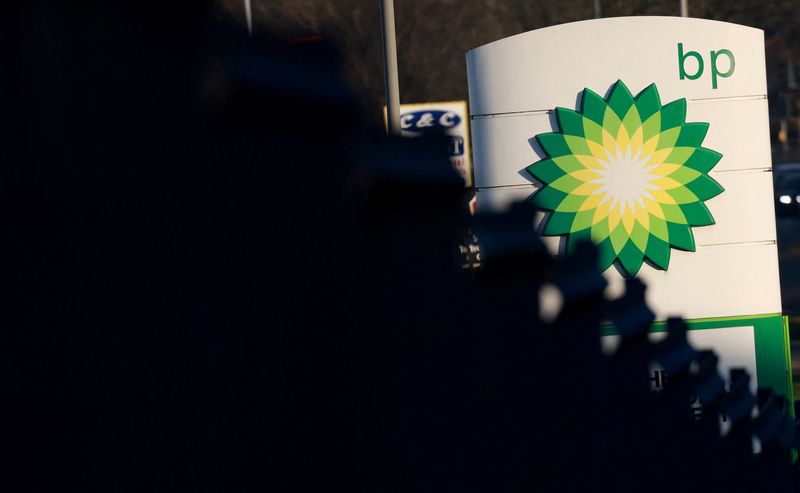By Ron Bousso and Deep Kaushik Vakil
LONDON (Reuters) -BP posted forecast-beating earnings of $3 billion for the fourth quarter and boosted share repurchases as its recently appointed CEO vowed to make pragmatic investments in an effort to allay investor concern over its energy transition strategy.
The company's shares were more than 5% higher by 1200 GMT on Tuesday following the unexpected acceleration of the buyback programme.
The quarterly results, lifted by strong gas trading, took the energy giant's 2023 profit to $13.8 billion, although that was half that of a year earlier as oil and gas prices cooled and refining profit margins weakened.
The earnings come as a relief to CEO Murray Auchincloss after the company substantially missed forecasts in the previous two quarters.
Auchincloss became permanent CEO in January after being named interim CEO on Sept. 12 when Bernard Looney abruptly stepped down for failing to fully disclose details of past personal relationships with colleagues.
Auchincloss told Reuters that BP (NYSE:BP) remains committed to its strategy to reduce oil production by 25% from 2019 levels by 2030 to 2 million barrels per day while growing its renewables and low-carbon businesses by the end of the decade.
But at the same time he said BP could grow its oil output beyond its 3% target for 2022 to 2027, depending on returns, in a nod to investors concerned that the British company's energy transition will destroy value.
"As we drive towards 2025 we are going to focus on simplifying the business," he said. "We will pragmatically adapt to what's happening with demand in society...We will go for the highest return and highest value projects."
BP has 12 to 16 oil and gas projects that could potentially get the green light over the next two years, he said.
BP's shares have underperformed rivals in recent months amid the concerns over its strategy and the leadership upheaval.
The company said it was committed to repurchasing $3.5 billion of shares in the first half of 2024 and expects to purchase $14 billion over 2024-2025.
"BP delivers what investors were asking for: higher distributions and more visibility," Jefferies analyst Giacomo Romeo said in a note.
STRONG TRADING
BP's fourth-quarter underlying replacement cost profit, the company's definition of net income, reached $2.99 billion, exceeding forecasts of $2.77 billion in a company-provided survey of analysts.
BP said the results reflected strong gas trading and higher oil and gas prices which were nevertheless offset by significantly lower refining margins amid sluggish global economic activity, weak oil trading and exploration impairments.
Rivals Exxon Mobil (NYSE:XOM), Chevron (NYSE:CVX) and Shell (LON:SHEL) last week also beat profit expectations on a mix of strong trading results and higher oil and gas production.
BP maintained its dividend at 7.27 cents per share and increased the rate of its share buybacks to $1.75 billion over the next three months from $1.5 billion in the previous three.

Capital expenditure in 2023 was unchanged from a year earlier at $16.3 billion, and is expected to dip to $16 billion this year and next.
BP generated more than $32 billion of cash last year, compared with $41 billion in 2022. It reduced net debt to $20.9 billion by year-end, the lowest in a decade, from $21.4 billion 12 months earlier.